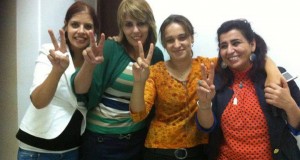Click here for the original article.
By Neta Golan
Anyone familiar with Israeli politics, was not surprised that Israeli Prime Minister Ehud Olmert did not acknowledge Israel’s occupation in his speech at Annapolis. What was surprising was, that, short of mentioning the “R” word- refugees, Olmert acknowledged the Palestinian refugee problem.
Referring to the Palestinians Olmert stated: “your people, too, have suffered for many years; and there are some who still suffer. Many Palestinians have been living for decades in camps, disconnected from the environment in which they grew up, wallowing in poverty, in neglect, alienation, bitterness, and a deep, unrelenting sense of humiliation.”
Olmert’s characterization of the refugees is partiall. Poverty, neglect and alienation are only one component of the refugee experience. There are other components, such as community, pride, generosity,and perseverance. This one-dimensional characterization suits Olmert’s conception of a solution, it casts refugees as objects that will be acted upon (once again), rather than subjects who can genuinely participate in finding a solution. A recent article in the Israeli newspaper Ha’aretz Daily titled “Refugees and Jerusalem: A question of money” Sheds light on the workings behind Olmert’s statements.
According to Israeli Historian Benny Morris “In the months of April-May 1948, units of the Haganah [the pre-state defense force that was to become the IDF] were given operational orders that stated explicitly that they were to uproot the villagers, expel them and destroy the villages themselves.” Yet Olmert presented the refugee issue as a humanitarian problem, not unlike one caused by a natural disaster, saying that “Israel will be part of an international mechanism that will assist in finding a solution to this problem”.
The solution Olmert suggests is: “an international effort, in which we (Israel) will participate, to assist these Palestinians in finding a proper framework for their future, in the Palestinian state that will be established in the territories agreed upon between us.” The suggestion that the refugees do not have the choice to return to the lands from which they were expelled but instead “return” to a future Palestinian state, is contrary to international humanitarian law, and to UN resolution 194 that “Resolves that the refugees wishing to return to their homes and live at peace with their neighbours should be permitted to do so at the earliest practicable date”. Despite this, U.S President George Bush promised Ariel Sharon in a letter on the 14Th of April 2004: “…an agreed, just, fair and realistic framework for a solution to the Palestinian refugee issue as part of any final status agreement will need to be found through the establishment of a Palestinian state, and the settling of Palestinian refugees there, rather than in Israel.” The promises were subsequently ratified by both the United States House and Senate. Olmert referred to this letter in his Annapolis statement as a departure point for the negotiations.
According to Ha’aretz The Aix Group, “a semi-official political-economic backchannel” AIX group members, who include Israeli, Palestinian and International economic experts, academics, members of economic organizations, and officials from international institutions, including the World Bank, the International Monetary Fund and the European Union, submitted a document to the Israeli team preparing Olmert’s Annapolis statement.
The document opens with a declaration of principles that “an agreed and just long-term solution to the problem of the 1948 refugees must be based on the relevant United Nations resolutions, including General Assembly Resolution 194″ but then nullifies that statement by saying that: “while recognizing that a literal application of this Resolution is no longer possible given the substantial changes on the ground”. The document then describes an arrangement that would substitute the U.N. resolution which they have deemed no longer applicable. As stated, “The parties would agree that the measures recommended in the paper implement Resolution 194.”
The reference to “substantial changes on the ground” as an obstacle that render the UN resolution inapplicable, perpetuate the myth that physical or material obstacles render return impossible. According to Salman Abu Sitta an expert on the Palestinian refugee issue “90% of the village sites are still vacant, 7% are partially built-over, and only 3% are totally built over in Tel Aviv and West Jerusalem.” A hint to what the real obstacle may be lies in Ha’aretz corespondent Akiva Eldar’s statement “The Aix Group is convinced that if bold steps are not taken in the right direction, the vision of one state for two peoples, based on joint citizenship and equality before the law, will be placed on the agenda.”
The group suggests an international committee of experts would determine what constituted “fair and full” compensation for property claims. They estimate that the total cost of these claims will be between $15 billion and $30 billion.” According to Ha’aretz this and more money can be attained in a period spread out over 10 years and with extensive, generous international aid. In It’s proposal The group suggests that in cases in which “fair and full compensation” is offered “restitution” (the right of return) will not be considered. This formulation turns the basic principle set in the UN Principles on Housing and Property Restitution for Refugees and Displaced Persons on end. The principles clearly notes that restitution is the primary remedy and compensation only comes into play if refugees themselves choose compensation or if restitution is factually not possible as determined by an independent tribunal. They suggest that refugees will be sponsored financially to relocate to countries that would chose to accept them or be rehabilitated in their current county of residence. They also suggest that a fund be created from which every refugee receive 4000$ each for what the group calls refugeehood.
Under international humanitarian law the rights of refugees to return to their homes like all human rights it is invaluable and cannot be bought. Under Israel and Bush’s “solution” Palestinian refugee families which had been expelled from what is now Israel would be consigned to return, not to their homes, but to small, non-contiguous parts of less than 22% of their original homeland. Jews from anywhere in the world, on the other hand,would be free to “return” to more than 78% of historic Palestine, frequently to live on land seized from those same Palestinian refugees. Such clear discrimination against Palestinian refugees and privileging of Jews from anywhere in the world illustrates clearly that these proposals would further an separate but unequal solution that cannot result in peace.
 International Solidarity Movement Nonviolence. Justice. Freedom.
International Solidarity Movement Nonviolence. Justice. Freedom.


